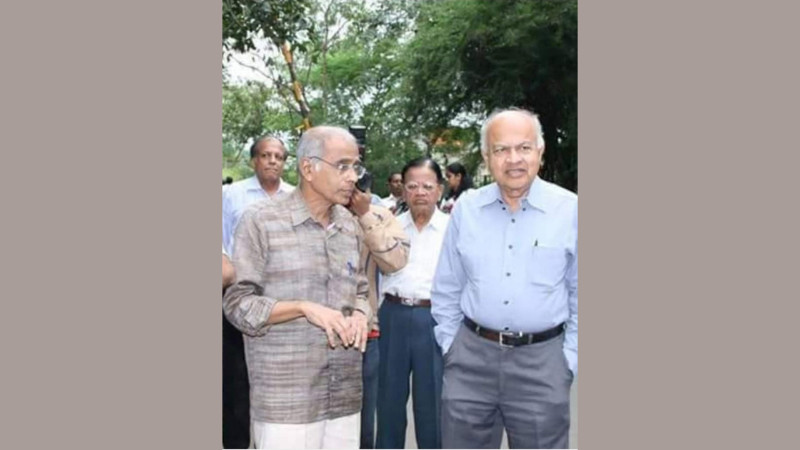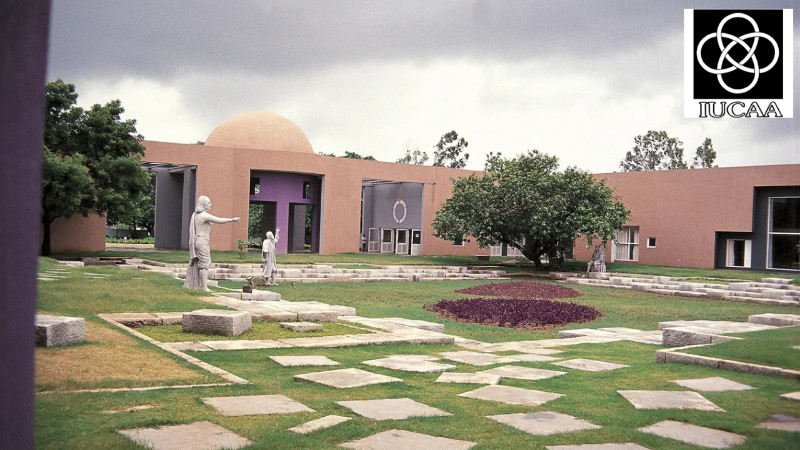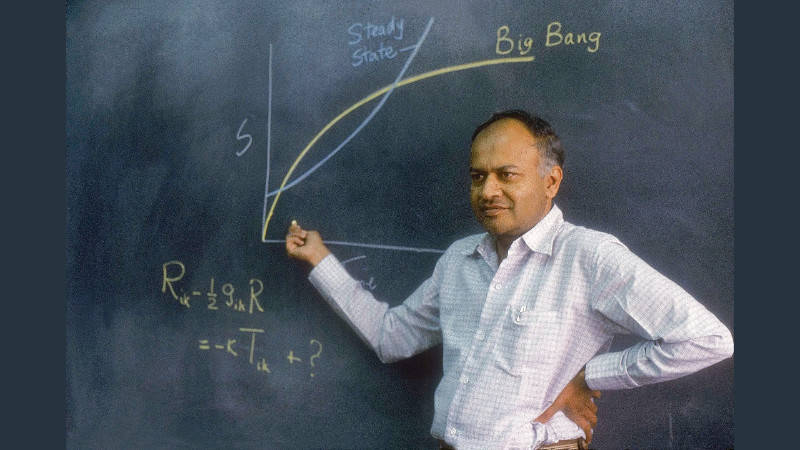Jayant Naralikar was one of India’s most revered astrophysicists. He was a champion of scientific temper. Among his many accomplishments, he ran a campaign to establish that astrology is not a science. Inspired by a similar experiment conducted in the U.S., Naralikar joined hands with Dr. Narendra Dabholkar to conduct the experiment in India. To mark Dr. Dabholkar’s first death anniversary, Naralikar had written an account of their collaborative campaign in Weekly Sadhana. Now, on the passing of Naralikar himself, we are publishing this article in English for a wider reader-base. It goes to show that the union of two visionary minds, both advocates of rationality and scientific temperament, can immensely benefit society.
Due to freedom of thought and expression, several religions, sects, philosophies etc. prospered in our country. But along with that, many superstitions too were nourished. These superstitions have had an adverse effect on our society and therefore, it is necessary for us to put an end to these superstitions.
The best way to counter superstition is through scientific perspective. Observations, experiments and inferences form the foundation of science. This scientific perspective should be applied in all spheres of life. For instance, if a public authority makes a statement, one should not accept it at face value but examine the veracity of the statement by testing the facts and thereby drawing conclusions. This is the application of the scientific perspective in the daily grind.
I had the opportunity to participate in such a scientific experiment in 2008 with Dr Narendra Dabholkar and his organisation “Andhashraddha Nirmulan Samiti”. The experiment was to examine the validity of astrology as a real science. I think it’s necessary to tell you the proceedings of that experiment. Because I’m sure you occasionally hear something or the other about astrology and wonder how true any of it is.
So, astrology claims to ascertain whether a marriage will be successful or not by examining the horoscope of a person. We decided to test this claim of theirs. We mixed up the horoscopes of couples whose marriages and succeeded and those whose marriages had failed. We decided to hand these over to astrologers and have them sort the horoscopes of those with failed and successful marriages. If the horoscopes were truly indicators of marriage success, then the astrologers should have been able to sort the horoscopes correctly.
Such an experiment had been previously conducted in the USA and the astrologers had failed the test. Since people rely on such astrologers in India to decide whether or not to marry, we felt it was essential to carry out this experiment in India.
But scientific examination should be devoid of loopholes. In this case, the issue was, how does one determine whether or not a marriage is successful? There are couples who stay together despite having a multitude of differences. Not every unhappy couple opts for a divorce. Are those marriages to be considered successful or not? This put us into a quandary and Dr Dabholkar came to our aid; suggesting a better alternative to our experiment.
Instead of using successful/unsuccessful marriages as a parameter, we decided to obtain horoscopes of intelligent children and mentally disabled children. Astrologers claim that they can ascertain the future of a child simply by looking at such horoscopes. So they should be able to differentiate the horoscopes of intelligent and disabled children.
Dr Dabholkar, along with his organisation set about collecting data from various schools of children. In this exercise we were helped by two other people. Firstly, retired Professor Sudhakar Kunte from Pune University’s statistics division who undertook the responsibility for designing the the experiment methodology. Secondly, Mr Prakash Ghatpande, who was responsible for creating horoscopes for the children in the study based on their birth date, time etc. Mr Ghatpande used to be an astrologer but realising the falsehood of astrology, had quit the profession.
We collected data of 100 intelligent children and 100 mentally disabled children. Mr Ghatpande prepared their horoscopes and we gave the horoscopes code numbers and Mr Kunte held these codes secret.
To begin the experiment, the four of us (Dabholkar, Kunte, Ghatpande and I) organised a press conference at Pune on the 12th of May 2008. At this press conference, we openly challenged practicing astrologers to participate in our study. The terms of the study were laid down as under-
Every participant shall send to us, by registered post, their professional details and address for correspondence.
Every participant shall be sent a random selection of 40 horoscopes from the 200 collected by us.
The participant shall analyse the horoscopes and accordingly determine whether each horoscope belongs to an intelligent child or a disabled child. The answer should be recorded on the horoscopes and sent to Mr Kunte.
To conclude that ‘Horoscopes can determine a child’s intelligence’, according to statistics, at least 28 of the 40 horoscopes must be sorted correctly by the participant.
The reason for the last condition was that, if one tossed a coin deciding heads for ‘intelligent’ and tails for ‘disabled’, there was still a chance of 20 of the 40 answers turning out to be right by sheer chance. But the probability of getting 28 correct answers by chance was highly unlikely. Thus it was decided that of the 40 horoscopes, the astrologer needs to get at least 28 accurate results as a testimony of their successful predictions.
Around 51 astrologers asked for samples of the horoscopes and 27 replied with results. The best performer among the respondents had 24 correct results. Two astrologers got 22 out of 40 correct. Hence, none of the astrologers could pass the test. The average of all the respondents came to 17.25, way below the 28-mark.
We had also challenged certain organisations affiliated with astrology to take up this challenge. Only oe such organisation participated. We gave them all 200 horoscopes. They were able to correctly determine 102, falling below the statistically acceptable mark of 118.
When the results of the experiment were published, several astrologers claimed that since ‘Andhashraddha Nirmulan Samiti’ is an anti-superstition association, the study must have been biased. Dr Dabholkar attested that the study had been conducted in an entirely unbiased manner and was designed by Mr. Kunte who was an uninterested party. (Dr Dabholkar always maintained a calm demeanour when addressing retractors, never losing his cool)
After the study results were published, a lot of astrologers also claimed that the astrologers who participated in the study were not competent and therefore the results were unfavourable to astrology. But the 51 astrologers who participated had all provided us with details of their long-term experience in the field. Besides, an association of astrologers had also taken part and failed miserably. Wasn’t the association entirely comprised of astrologers?
It is essential that we try our best to test the authenticity of things like astrology and vastushastra. These concepts did not originate in India but have found most followers in our country. No other country has as many astrologers as India does.
We conducted this experiment to debunk the claims of astrology as a legitimate science. Many more experiments can be conducted to ascertain the same. Dr Narendra Dabholkar encouraged all such endeavours. After his passing, I hope there will be other truth-seekers who will continue the work.
- Jayant Naralikar
(Translated by Priyanka Prabhu)
Originally published in Marathi on the occasion of first death anniversary of Dr Narendra Dabholkar, in Weekly Sadhana : August 30, 2014. नरेंद्र दाभोलकर यांच्याबरोबरची एक संस्मरणीय मोहीम - जयंत नारळीकर
Tags: astrology astronomy dr narendra dabholkar narendra dabholkar dabholkar jayant naralikar IUCAA astrophysics physics science memory memoir जयंत नारळीकर नरेंद्र दाभोलकर डॉ. नरेंद्र दाभोलकर नारळीकर आयुका खगोलशास्त्र फलज्योतिष अंधश्रद्धा निर्मूलन समिति अंधश्रद्धा अंधश्रद्धा निर्मूलन समिती अंनिस Load More Tags





























Add Comment